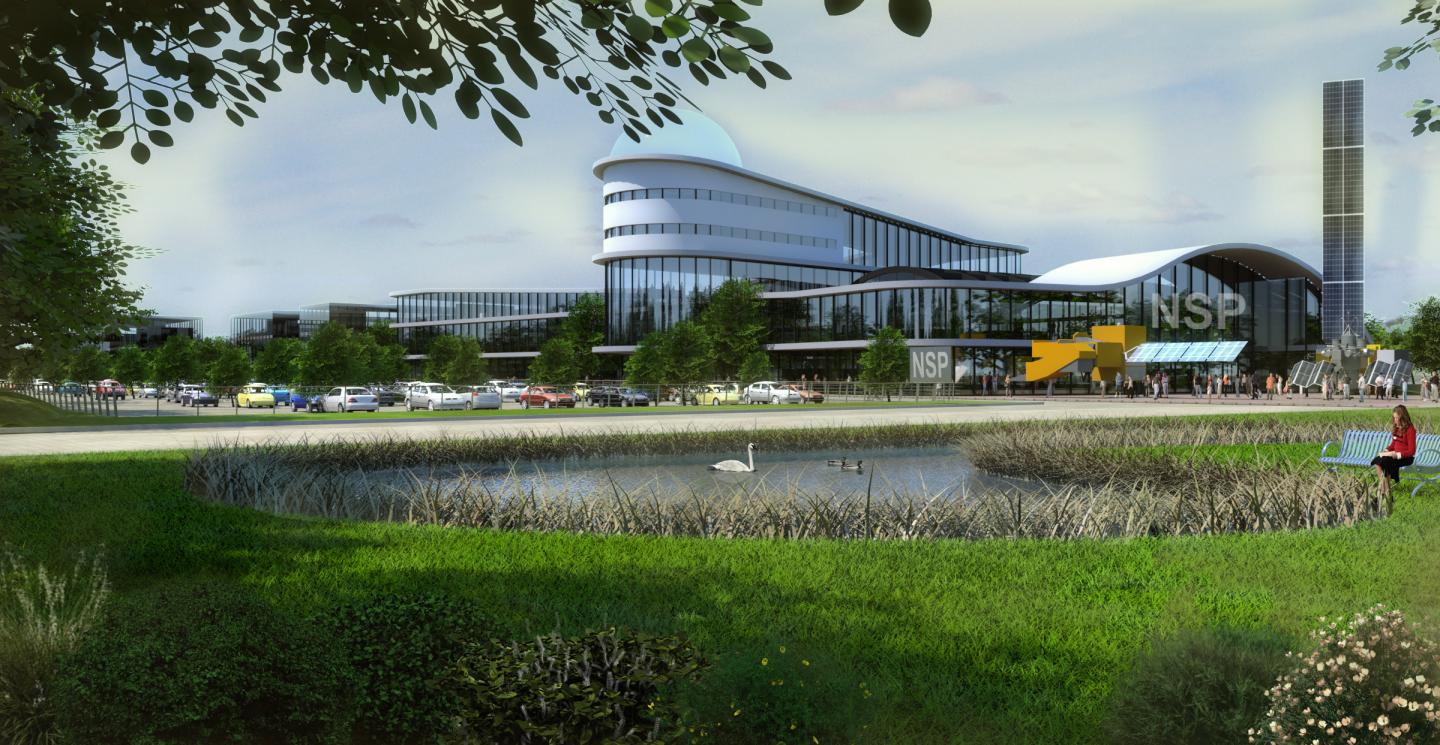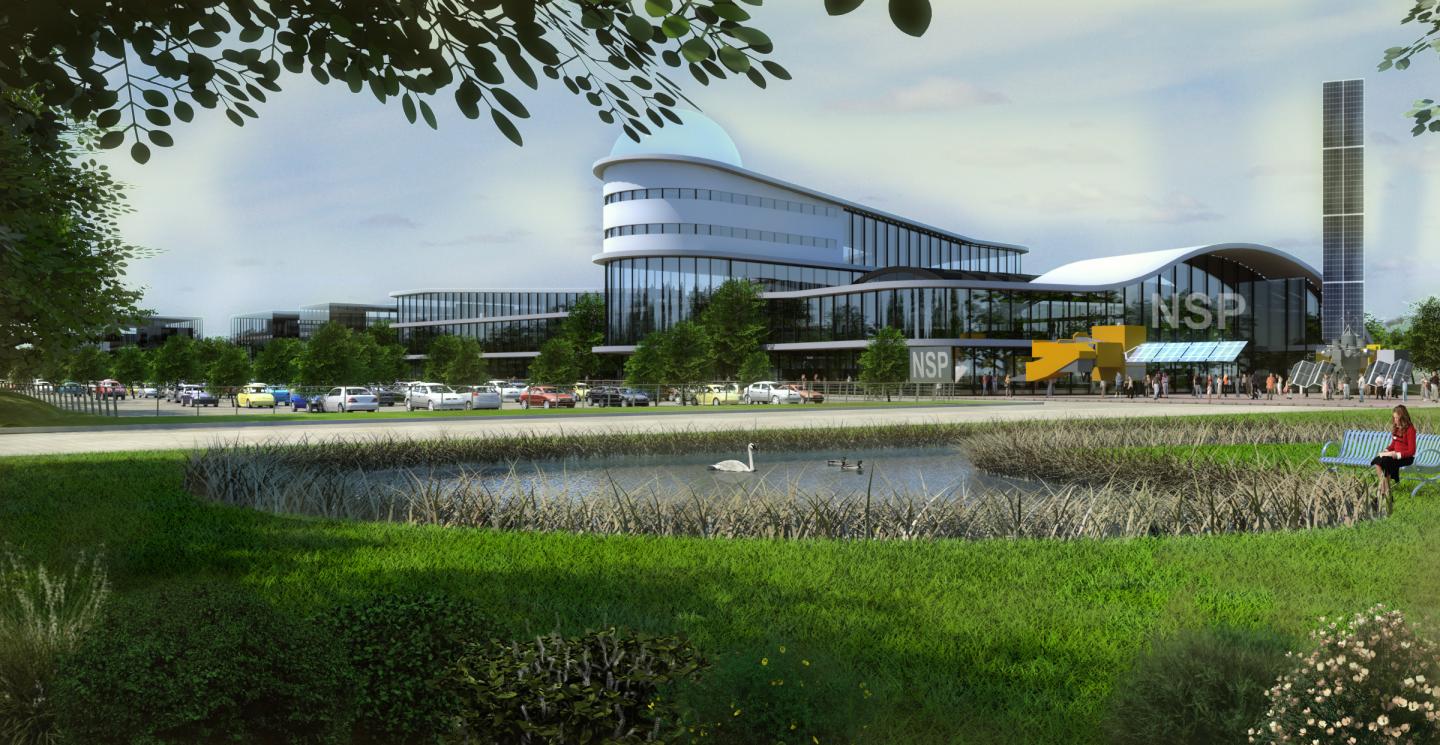
Credit: University of Leicester
Academic leaders at the University of Leicester have hailed the Government's announcement of multi-million pound investment in space science and Earth observation technologies – following a bid led by the University of Leicester together with the City and the LLEP – as launching Leicester as an important UK Space City and addressing key elements of the Government's Industrial Strategy.
Leicester already houses the National Space Centre, the Millennium Commission-funded project that was the brainchild of the University of Leicester.
Now the Government has announced funding to kick start the development of the National Space Park next to the National Space Centre. This is a project spearheaded by the partnerships between the University of Leicester, Leicester City Council, Leicester and Leicestershire Enterprise Zone (LLEP) and the National Space Centre.
This follows the announcement last month of Enterprise Zone status at sites in Loughborough and Leicester. At Leicester Waterside, the enterprise zone provides a focus on space and space enabled technologies: The National Space Park is an ambitious project of global significance that is backed by national and regional authorities recognising the strategic importance of science, high-tech manufacturing, and space-enabled industry to UK growth.
The key aims of the National Space Park directly address priorities in the Government's recently announced Industrial Strategy. These are:
- Research and development supporting world-leading UK capability in satellite manufacture and use, provision of low-cost access to space, and recognising the status of satellites as one of the eight emerging technology sectors identified as supporting UK global science and commercial leadership
- Access to, and analysis of space-enabled data, including 'Big Data', the ability to 'combine vast sets of data in new ways to create new linkages, patterns and ultimately new knowledge […to] address the major challenges facing society including food security, climate change, pollution and biodiversity loss.' (UK National Space Policy, 2015). Today, space is regarded as critical to delivering on ambitions for UK Plc. From scientific understanding to rebuilding the Midlands manufactories with a new high-tech focus, space-enabled research, to the strategic importance of the work that space research delivers for vital services including communications, disaster relief and transport, we recognise the importance of space for our economy as never before.
- Skills for UK industry in the form of education and training for the space and related high technology sectors, including traditional University undergraduate and postgraduate courses, but also provision of apprenticeships, and continuing professional development.
Professor Paul Boyle, President & Vice-Chancellor of the University of Leicester said: "It's great to hear that the government is again backing Leicestershire's success by investing in our world-class research and development clusters.
"From the life sciences to R&D supporting investment in energy, space and satellite technologies, Leicestershire is emerging at the forefront of UK research. The National Space Park is going to have a huge impact on the city and region – and it will be nationally important.
"Our new project, with a working title of National Space Park, will be a true game changer. It will help us deliver against at least three of the challenges that Government has articulated in their Industrial and Midlands Engine strategies.
"First, drawing on our expertise in space engineering, we will be able to focus on lowering the cost of access to space for satellite systems and improve their instrumentation and potential.
"Second, we will better harness earth observation and other space enabled data for our own challenges here on own our planet, such as supply chain resilience, air quality and of course managing the traffic!
"And, third, with our friends here in the National Space Centre, we will specifically address skills shortages through apprenticeships, professional training and business-focused degrees and internships. Our new venture will create new firms and an estimated 500 jobs for the local economy."
Professor Iain Gillespie, Pro-Vice-Chancellor for Research & Enterprise said: "No project has brought together so many people from across the University, working in concert to deliver a project which is truly important not just to us, or to regional partners, but for the UK's research ambitions in future. Our work in space science and Earth observation is world-renowned and this announcement demonstrates the importance of our research capability to the world. It will enable us to build new partnerships, explore the commercial and transformative aspects of our research and help us to create opportunities for training future generations of researchers.
"In Leicester we have a fantastic heritage in manufacturing. But we need to make it more high-tech and we have a great opportunity to do that using an old industrial site where- at one point- Leicester was leading the world. We want to lead the world again in high-tech, this time around space, space engineering and space data. It is an amazing opportunity to build not just new high-tech facilities here in Leicester at the National Space Park but to build jobs, to create spin-outs and, with the Dock scheme, to build new businesses and locate them here at the hub of the UK in Leicester.
"For us here in the University of Leicester, this project provide fantastic opportunities, allowing us to take our research expertise, and indeed our teaching expertise, and push that into a skills economy and into the service of economic growth here in our community. This project is an extension of our science, an extension of our educational prowess and, at the same time, the work that is done will be picked up by industry and feed back in there. It will be a virtuous cycle for this university – it really allows us to have even more punch above our weight."
The National Space Park builds on the University of Leicester's 50-year-plus record of delivering the science and engineering which has enabled exploration of space to Jupiter and beyond. Working with commercial and research partners, the University will push satellite development and space-enabled data sciences further; opening up new possibilities in global satellite imaging and detection.
The National Space Park will complement government investment in other space clusters including the UK Space Gateway at Harwell, and the newly announced Spaceport opportunities around the UK. In line with government policy, the aim is to replicate the "Harwell effect", creating new centres of expertise in the downstream space sciences aligned to local "smart specialisations."
In Leicester, our specialisation is in space-enabled data and Earth observation based at the newly opened Leicester Institute of Space and Earth Observation (LISEO). LISEO brings together the University of Leicester's space research including astronomy and the planetary sciences with the multidisciplinary work underpinning our Earth observation practice, including researchers working Mathematics, Engineering, Physics, Geology, Geography, Chemistry, Informatics and other subject areas.
Professor Martin Barstow, Pro-Vice-Chancellor for Strategic Science Projects and Director of the Leicester Institute of Space & Earth Observation, said: "The National Space Park is a tremendously exciting project for the University, City and region. Building on our 57-year track record of space exploration, it will create a nationally and internationally important space facility that will support a cluster of space businesses alongside research and teaching facilities, making Leicester an important "space city". It will be an important part of Leicester's regeneration and contribute to the economic growth of the region with the new, high value jobs that will be created. With its world-leading Institute of Space & Earth Observation, the National Space Park will address the skills gap to support this rapidly growing sector and make Leicester an important force in the future of space exploration."
Space technology is not simply a thing of the future – it's the here and now and will be at the heart of the successful economies of the future. Every time we go to work, turn on the television, make a mobile phone call or engage satnav systems, space technology is behind it. It connects our armed forces and our humanitarian agencies and delivers the essential intelligence needed to keep peace in an increasingly fragmented world.
###
Government announcement of the Midlands Engine Strategy: https://www.gov.uk/government/news/midlands-engine-to-roar-ahead-with-ambitious-new-strategy
LLEP press release: http://www2.le.ac.uk/offices/press/press-releases/2017/march/over-ps25-million-growth-money-for-local-economy
More information and multimedia for National Space Park: http://www.le.ac.uk/media-nationalspacepark
National Space Park Website: http://www2.le.ac.uk/institution/spacepark
Video interview on the National Space Park: https://www.youtube.com/watch?v=6Kam6u2tak4
Media Contact
University of Leicester Press Office
[email protected]
@UoLNewsCentre
http://www.leicester.ac.uk
############
Story Source: Materials provided by Scienmag





